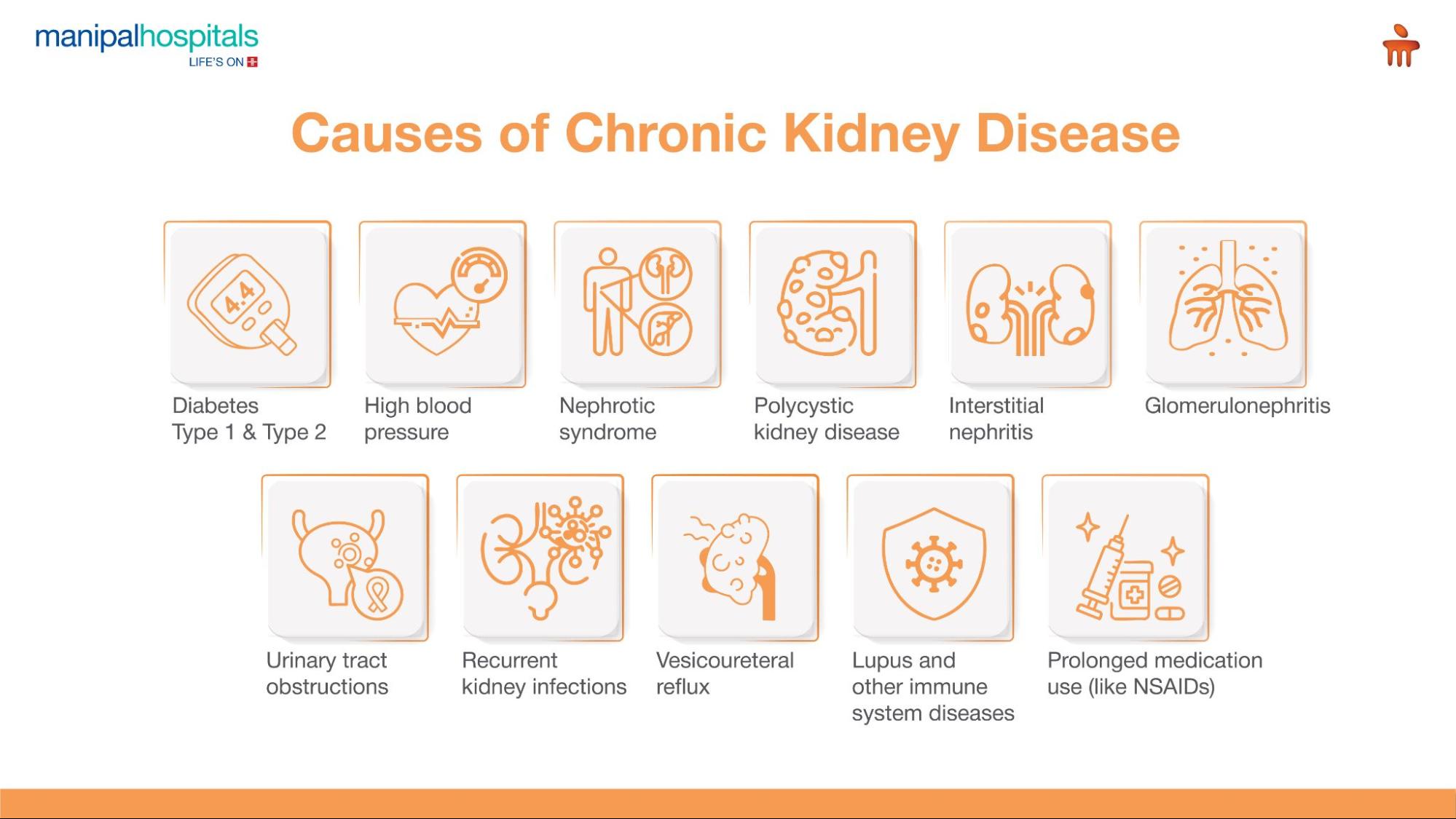Chronic kidney disease (CKD) is a serious condition that occurs when the kidneys become damaged or lose function over time. It impacts the urinary system and overall health. Almost 850 million people worldwide are affected by CKD, and it is estimated to become the fifth largest cause of years of life lost by 2040.1 In India, studies have reported an overall CKD prevalence of 13.24%, with men at 14.8%, women at 13.5% and rural areas showing higher rates.2 Early detection and awareness of chronic kidney disease causes and symptoms are crucial to preventing long-term complications.
But a lack of awareness and timely diagnosis is contributing to the rising burden of kidney failure in India, with approximately 210,000 new cases being diagnosed each year.1 In this blog, you will explore chronic kidney disease, its causes, symptoms, and treatment strategies.
Synopsis
What is Chronic Kidney Disease?
Chronic kidney disease is a long-term condition in which there is a progressive loss of kidney function. It is also called chronic kidney failure and is characterised by an estimated glomerular filtration rate (eGFR) of less than 60 ml/min/1.73 m2 persisting for 3 months or more.
The chronic kidney disease progresses through five stages, from mild damage in stage 1 to complete kidney failure in stage 5 (also called end-stage renal disease or ESRD), requiring Dialysis and Transplantation.
Chronic Kidney Disease Symptoms
Chronic kidney disease in its early stages may not show noticeable symptoms. Still, as the disease worsens, symptoms begin to appear, which may vary depending on the severity of the disease. These include:
-
Urinating more or less
-
Fatigue and weakness
-
Loss of appetite
-
Muscle cramps
-
Swelling of feet and ankles
-
Dry and itchy skin
-
Trouble concentrating
-
Sleep issues
-
Nausea and vomiting
-
Puffy eyes
-
Shortness of breath
-
Chest pain
-
Skin darkening
Chronic Kidney Disease Causes

Various types of chronic diseases or conditions can damage the kidneys, affecting their filtering capacity, which worsens over time, leading to chronic kidney disease.
Common chronic kidney disease causes include:
-
Diabetes - type 1 and type 2
-
High blood pressure
-
Glomerulonephritis, inflammation of the kidney’s filtering units
-
Polycystic kidney disease
-
Interstitial nephritis, inflammation of the kidney’s tubules and surrounding structures
-
Nephrotic syndrome
-
Urinary tract obstructions due to kidney stones, an enlarged prostate, and some cancers
-
Recurrent kidney infections
-
Vesicoureteral reflux
-
Lupus and other immune system diseases
-
Prolonged medication use (like NSAIDs)
Impact of Chronic Kidney Disease on the Urinary System
The urinary system consists of the ureters, bladder, urethra, and kidneys. Thus, chronic kidney disease not only affects the kidneys but can also impact the entire urinary system. Here's how:
-
Reduces urine output, leading to swelling in the legs, ankles, or face
-
Changes in urine appearance, which may be foamy, bubbly, with blood or protein in the urine
-
Increased frequency of urination, especially at night, called nocturia
-
Causes recurrent urinary tract infections, irritating the bladder and affecting the urinary flow
-
Interferes with nerve signals to the bladder, leading to incontinence, urinary retention, or difficulty emptying the bladder completely
Chronic Kidney Disease Diagnosis
Early diagnosis of chronic kidney disease can help slow the progression of the disease. The healthcare provider will understand your medical history, perform a physical examination and enquire about the symptoms you are experiencing. To confirm the diagnosis, certain diagnostic tests may be ordered.
These include:
-
Urine tests to assess protein or blood in the urine
-
Blood tests to check the glomerular filtration rate and serum creatinine level
-
Imaging tests, such as ultrasound, MRI, and/or CT scans, to examine the size and structure of the kidney
Chronic Kidney Disease Treatment
The chronic kidney disease treatment aims to preserve kidney function as long as possible. This is done by reducing complications, slowing the progression of the disease and controlling its signs and symptoms. Treatment will depend on the cause, and generally, chronic kidney disease has no cure.
The treatment includes
-
Medications like angiotensin-converting enzyme (ACE) inhibitors, angiotensin receptor blockers (ARB), diuretics, etc.
-
Dietary modifications, consuming a kidney-friendly diet, not smoking, exercising regularly, etc.
-
Dialysis - Hemodialysis, Peritoneal Dialysis
In addition, timely diagnosis and appropriate chronic disease treatment are essential to slow the progression of kidney damage and maintain overall urinary health.
Conclusion
The impact of chronic kidney disease on the urinary system is profound, often leading to significant changes in urination, increased risk of infections, and eventual kidney failure if left unmanaged. Understanding how chronic kidney disease affects your body and taking steps for early diagnosis, lifestyle changes, and chronic disease treatment can help prevent complications and improve quality of life.
If you or a loved one is experiencing signs of urinary changes, fatigue, or swelling, consult a nephrologist at Manipal Hospitals, Mukundapur, for timely evaluation and care.
FAQ's
Chronic kidney disease is generally not reversible, but diagnosing it at an early stage can help in better managing it with lifestyle changes and treatment.
Yes, kidney disease is hereditary and runs in families. Also, diabetes, which is a major risk factor, runs in families.
If not treated timely, chronic kidney disease can lead to anaemia, metabolic acidosis, gout, weaker bones, nerve damage, heart diseases, hyperkalemia, hyperphosphatemia, fluid buildup and a weaker immune system.
Medication, lifestyle changes and hormone therapy can help regularise periods. For stress-related period issues, treatment involves managing stress and addressing emotional triggers. Cognitive Behavioural Therapy may be helpful.
If you experience foamy, dark-colored, or bloody urine, immediately get an evaluation done by a nephrologist to rule out its cause, as early detection can help in better treatment.
You can schedule an appointment with our nephrologist at Manipal Hospitals, Mukundapur, by contacting us or visiting our website.
Visit: https://www.manipalhospitals.com/mukundapur/specialities/nephrology/
Contact no: 033 6907 0001





















 6 Min Read
6 Min Read



















